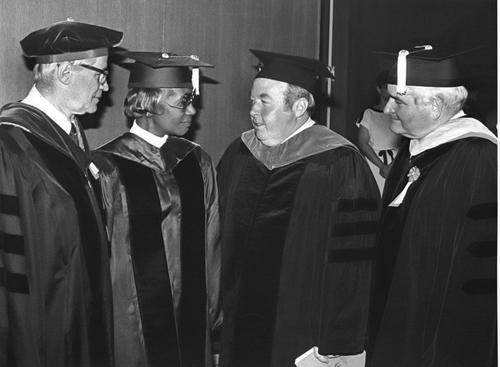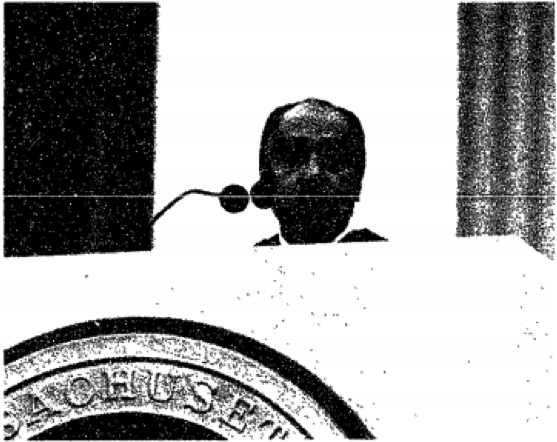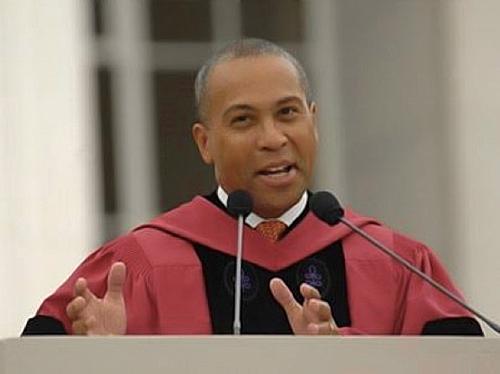MIT Commencement
The President of the Institute was the principal speaker at Commencement exercises prior to 1950 and from 1964 to 1982. The first MIT Commencement speaker of record was Unitarian clergyman Rev. George E. Ellis in 1880. In 1982, Katharine M. Graham, publisher of the Washington Post, became the first outside speaker to deliver the address.
Today, a subcommittee of the Commencement Committee recommends five possible speakers to the Institute President, based in part on a survey of the graduating class the spring prior. After receiving the list, the president can choose one of the people on it or name someone completely different to speak.
The entire process of speaker selection is shrouded in secrecy. "The subgroup never releases the list of speaker choices," said Mary L. Morrissey, former director of the MIT Information Center ("Massey Graduation Speaker," The Tech, 12 March 1991). According to Morrissey, the names are withheld in order to avoid embarrassing the chosen speaker.
The Commencement Committee has an official policy that actors, authors, and performers are not permitted to speak, though the likes of author Alice Walker and physicist Stephen Hawking also ranked high on the seniors' list. This policy was broken in 2016, when actor Matt Damon delivered the 2016 MIT Commencement address.
READ MORE: A History of MIT Commencement Speakers
Shirley Chisholm
Adapted from "MIT Names Shirley Chisholm as Commencement Speaker," The Harvard Crimson, 10 February 1984
Former U.S. Representative Shirley Chisholm addressed graduating students at MIT's commencement on Monday, June 4, 1984, marking only the third time an outside speaker had given the ceremony's Leynote speech.
Chisholm, the first Black woman elected to Congress, was known as a strong advocate of minority and women's rights during her seven terms in Congress. In 1972, she became the first Black woman to mount a bid for the presidency.
Chisholm graduated from Brooklyn College and received a master of arts degree from Columbia University. In 1964, she was first elected to the New York State Assembly, where she served until 1968, when she was elected to Congress. Chisholm retired from Congress in 1982 and was appointed a political science professor at Mount Holyoke College.

Shirley Chisholm (second from left) with Professor Noam Chomsky (left) and MIT President Paul Gray (far right) at Commencement, June 1984.
Walter Massey
Science Official Tells MIT of Peril to Ethics
The New York Times, 4 June 1991
Dr. Walter E. Massey, the newly appointed director of the National Science Foundation, told graduates of the Massachusetts Institute of Technology yesterday that changes in the size, complexity and cost of modern research had endangered traditional scientific ethics.
Addressing the 1,773 graduates and their 8,000 relatives and guests attending M.I.T.'s 125th commencement, Dr. Massey said: "Scrupulous attention is especially important now. Growing competition for funds, tenure and acclaim; increasing chances of financial conflicts of interest among researchers; even the scope of intellectual ferment -- with disciplinary boundaries breaking down and new ideas and techniques challenging traditional paradigms -- all these conditions make science and engineering more vulnerable to falsehoods."
He added, "Universities must be above reproach in all conduct relating to research, be it insuring scientific integrity or allocating indirect costs."
Dr. Massey began his six-year term at the science foundation on March 4. Previously, he had been a professor of physics at the University of Chicago, where he also served as vice president for research.
In the traditional charge to the graduates by the institute's president, Charles M. Vest, presiding over his first M.I.T. commencement, urged the graduates to make public service a part of their lives. Swarthmore College
Swarthmore College conferred 320 undergraduate degrees yesterday at its 119th commencement exercises at its campus in Swarthmore, Pa.
Following Swarthmore tradition, the three recipients of honorary degrees, all Swarthmore alumni, were the main commencement speakers.
Paul Brest, dean of the Stanford University Law School, told the graduates: "There is a genuine reason for concern about the state of free inquiry in American colleges and universities. There is equal reason for concern about the sense of acceptance and self-esteem of students of color, women students, and gay and lesbian students on our campuses, and even about their safety."
Mr. Brest told the students to "help develop, protect and support a vision of higher education" where inquiry and acceptance can flourish.
The other commencement speakers were Cushing N. Dolbeare, founder of the National Low Income Housing Coalition, and Walter Lamb, chairman of Robert E. Lamb Inc., an engineering and construction company. Polytechnic University
"Engineering is now undergoing an important renaissance in this country," Dr D. Allan Bromley, the White House science adviser, told graduates at Polytechnic University's 136th commencement yesterday. To meet the demand, he said, schools must begin attracting more women and members of minority groups.
Eight hundred seniors from the university's three campuses in Brooklyn, Farmingdale, L.I., and Hawthorne, N.Y., received undergraduate degrees in ceremonies held at Lincoln Center's Avery Fisher Hall in Manhattan. Honorary degrees were awarded to Dr. Bromley, to Dr. Samuel Goldberg, who holds a patent on the manufacture of novocaine, and to Dr. Otto Wichterle, president of the Czech Academy of Sciences.

National Science Foundation Director Walter Massey delivering the commencement address at MIT, 3 June 1991
Kofi Atta Annan
Adapted from MIT News: "Annan to speak at Commencement" (12 February 1997) and "Joy, reflection mark Commencement" (11 June 1997)
Kofi Atta Annan MBA '72, the seventh secretary-general of the United Nations, delivered the MIT Commencement exercises on Friday, June 6, 1997.
Graduates, families, friends and faculty of MIT shared a vision of world progress and a slightly giddy sense of personal optimism during the Institute's 131st Commencement exercises, held on a cool, clear day in Killian Court.
In addressing the graduates, President Charles M. Vest noted that they would work in a world "driven by. science and technology, internationalization and changing demography." He urged them to maintain a sense of social responsibility while pursing their careers.
Building on these themes, President Vest said in delivering his charge to the new graduates:
"Take your education, your talent and your energy and build us a nation and a world community that consider knowledge a gift to be shared. a healthy planet a place to be cherished. and human dignity and opportunity fundamental conditions to be enjoyed by all people."

MIT President Charles M. Vest (seated, left) shares a laugh with then-UN Secretary General Kofi Annan, MIT's Commencement speaker for 1997.
The principal speaker, United Nations Secretary General Kofi A. Annan, noted the similar goals and tactics used in diplomacy and scientific research and called upon the graduates to help maintain continued US support of the UN. Mr. Annan, who earned a master's degree in management from MIT in 1972, also reminisced about his days in Cambridge:
At the outset," he said, "there was competition--rather intense competition--among my cohorts. Each was equally determined to shine and to demonstrate his leadership qualities. I say 'his' because there were no women among us; I am certainly glad that has changed.
Walking along the Charles River one day in the middle of my first term, I reflected on my predicament. How could I possibly survive let alone thrive in this group of overachievers? And the answer came to me most emphatically: not by playing according to their rules. 'Follow your own inner compass,' I said to myself. 'Listen to your own drummer.' To live is to choose. But to choose well, you must know who you are and what you stand for, where you want to go and why you want to get there. My anxieties slowly dissolved.
What I took away from MIT, as a result, was not only the analytical tools but also the intellectual confidence to help me locate my bearings in new situations, to view any challenge as a potential opportunity for renewal and growth, to be comfortable in seeking the help of colleagues, but not fearing, in the end, to do things my way.
Born in Ghana in 1938, Annan received his master's degree in management from MIT's Sloan School of Management in 1972. He has three decades of service with the world organization. He is fluent in English, French and several African languages. He was undersecretary-general for peace-keeping operations on December 17 when he was appointed by the General Assembly to serve a five-year term of office beginning Jan. 1, 1997. Mr. Annan is an active alumnus who has visited MIT in recent years.
Annan has carried out a number of sensitive diplomatic assignments, including negotiating the repatriation of over 900 international staff and the release of Western hostages in Iraq following that country's invasion of Kuwait in 1990; initiating discussions on the "oil-for-food" formula to ease the humanitarian crisis in Iraq; and overseeing the transition from the United Nations Protection Force in former Yugoslavia to the multinational Implementation Force led by NATO following the 1995 Dayton peace agreement.
Annan was undersecretary-general for peace-keeping operations from 1993 until his new appointment, except for five months ending in March 1996 as UN special envoy to the former Yugoslavia.
He was educated at the University of Science and Technology in Kumasi, Ghana; Macalester College in St. Paul, MN; the Institut de Hautes Etudes Internationales in Geneva, and MIT.
Deval Patrick
Adapted from "'Write the next chapter': Gov. Patrick urges grads to embrace 'opportunity for change,'" MIT News, 5 June 2009
Noting that the current economic crisis is but an opportunity in disguise, Massachusetts Gov. Deval Patrick advised graduates at MIT's 143rd Commencement exercises on Friday, June 5, 2009 to take advantage of the skills they have learned at MIT to "write the next chapter of the American story."
As thousands of graduates, friends and family members, faculty, staff and others looked on under cloudy skies in Killian Court, Patrick reminded the Class of 2009 that they were a special breed - more likely to spend their time shaping the future rather than predicting it.
"Be the change you want to see in the world," the governor said. "Achieving any given ideal may demand more than any one individual's contribution, but it surely demands no less."
With today's graduates facing an economy in crisis, Patrick told them not to be fearful but rather to embrace its potential. "Crisis is a platform for change," he said. "Your ideas and contributions will defy prediction."

Massachusetts Governor Deval Patrick delivers his address during MIT's 143rd Commencement, 5 June 2009
Ursula Burns
Adapted from "MIT’s 145th Commencement, Xerox chair Ursula Burns urges graduates to live so that they leave behind more than they take away," MIT News, 3 June 2011
Under the sunny skies of a warm spring day, MIT celebrated its 145th Commencement exercises on June 3 in the expansive Killian Court, nearing the culmination of 150 days of celebrations of the Institute’s 150th anniversary. A total of 2,437 undergraduate and graduate degrees were awarded, to students hailing from 88 different nations.
This year’s Commencement speaker was Ursula M. Burns, the chairwoman and CEO of Xerox Corporation. Burns, the first African-American woman ever to lead a Fortune 500 company, has been a member of the MIT Corporation (the board of trustees that runs the Institute) since 2008.
Bryan Stevenson
Bryan Stevenson to deliver MIT’s 2021 Commencement address
From MIT News Office, 4 February 2021
Bryan Stevenson, a civil rights lawyer acclaimed for his work confronting bias against the poor and people of color in the U.S. justice system, will deliver the address at MIT’s 2021 Commencement exercises on Friday, June 4.
Stevenson is the founder and executive director of the Equal Justice Initiative, a human rights organization in Montgomery, Alabama, which has won legal challenges eliminating excessive and unfair sentencing, exonerating innocent death row prisoners, confronting abuse of the incarcerated and the mentally ill, and aiding children prosecuted as adults.
Stevenson has argued and won multiple cases at the United States Supreme Court, including a 2019 ruling protecting condemned prisoners who suffer from dementia and a landmark 2012 ruling that banned mandatory life-imprisonment-without-parole sentences for all children 17 or younger. He and his staff have won reversals, relief, or release from prison for over 135 wrongly condemned prisoners on death row and won relief for hundreds of others wrongly convicted or unfairly sentenced.
“At MIT, our mission calls on us to work for the betterment of humankind. Revealing and overturning societal injustice and inspiring others to join in this essential human struggle has been Professor Stevenson’s life’s work,” says MIT President L. Rafael Reif. “At a moment of such great upheaval, injustice, and suffering in our society, I cannot imagine a more important and motivating voice to address our graduates and our larger community.”
“As we face a future filled with uncertainty, now is the time for a renewed commitment to the idea that our own humanity depends on the humanity of everyone,” says Stevenson. “I look forward to speaking to the Class of 2021 as they prepare to share with the world their own signature blends of the innovation, creativity, and compassion that are celebrated at MIT.”
Many of Stevenson’s achievements are described in his award-winning memoir, Just Mercy, which was published in 2014 and adapted into a 2019 movie of the same name. The story is centered on the case of Walter McMillian, a Black man on death row for a murder he didn’t commit. In their years-long fight to have McMillian exonerated, Stevenson and his colleagues uncovered far-reaching systemic bias in the criminal justice system. This case and others galvanized their mission to combat mass incarceration and extreme punishment in the United States.
Stevenson has represented not only the unjustly accused but also people who have committed terrible crimes and yet struggled to recover and find redemption. As he writes in “Just Mercy,” this work “has taught me some basic and humbling truths, including this vital lesson: Each of us is more than the worst thing we’ve ever done.”
In addition to litigation, Stevenson and his team at the Equal Justice Initiative conduct other racial justice and public education projects, and provide research and recommendations for policymakers. In 2018 they established the National Memorial for Peace and Justice, which commemorates the Black victims of lynching in the United States, and the associated Legacy Museum, chronicling the connections from slavery to mass incarceration.
“Stevenson’s National Memorial for Peace and Justice, which I have visited, is a singularly important addition to our national landscape of monuments. It manages to honor the lives lost to lynching, while also capturing the horrors of their slaughter,” says Melissa Nobles, the Kenan Sahin Dean of the School of Humanities, Arts, and Social Sciences, and professor of political science at MIT. Nobles’ research and teaching have focused on the comparative study of racial and ethnic politics, and issues of retrospective justice. Her current research centers on constructing a database of racial killings in the American South from 1930 to 1954.
Stevenson received his bachelor’s degree from Eastern University in 1981, and graduated from Harvard University in 1985 with both a master’s in public policy from the Kennedy School of Government and a JD from the School of Law. He then joined the Southern Center for Human Rights in Atlanta, working out of its chapter in Montgomery, Alabama. He founded the Equal Justice Initiative in 1989 and has been on the faculty of the New York University School of Law since 1998.
Ngozi Okonjo-Iweala
“The world needs your smarts, your skills,” Ngozi Okonjo-Iweala tells MIT’s Class of 2022
By David L. Chandler, MIT News Office, 27 May 2022
On a clear warm day, the MIT graduating class of 2022 gathered in Killian Court for the first in-person commencement exercises in three years, after two years of online ceremonies due to the Covid-19 pandemic.
Ngozi Okonjo-Iweala MCP ’78, PhD ’81, director-general of the World Trade Organization, delivered the Commencement address, stressing the global need for science-informed policy to address problems of climate change, pandemics, international security, and wealth disparities. She told the graduates: “In these uncertain times, in this complex world in which you are entering, you need not be so daunted, if you can search for the opportunities hidden in challenges.” She urged them to go “into the world to embrace the opportunities to serve.”
An expert in global finance, economics, and international development, Okonjo-Iweala is the first woman and first African to lead the WTO. She earned a master’s degree in city planning from MIT in 1978, and a PhD in regional economics and development in 1981.
Okonjo-Iweala began her address by paying tribute to MIT President L. Rafael Reif, who earlier this semester announced plans to end his decade-long tenure in that role. Calling this a “bittersweet day” because of his departure, she honored “his academic, institutional, and thought leadership of these past 10 years.”
She spoke warmly of the way MIT had helped her while she was a graduate student struggling to pay the bills. She was assured that the Institute would do whatever was needed to make sure she could complete her studies, she recalled, saying, “They had my back.” Noting that this year’s graduating class had their own educational journeys challenged by the global pandemic, she described how her own early education was interrupted for three years by civil war in her home country of Nigeria. She also noted the recent tragic shootings in Uvalde, Texas, saying that “I feel grief as a mother and a grandmother.”
“MIT has helped make me who I am today,” she said. “My parents made it clear to me that education was a privilege, and that with that privilege comes responsibility — the responsibility to use it for others, not just for yourself.”
She said that what the world needs in this time of multiple global challenges, including Covid-19, climate change, public health, and international security, is an approach “combining science, social science, and public policy, to meet the challenges of our future.”